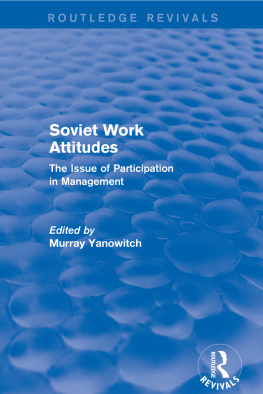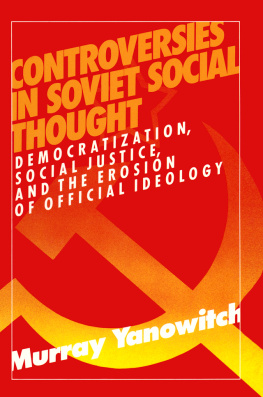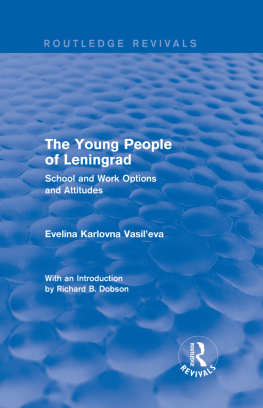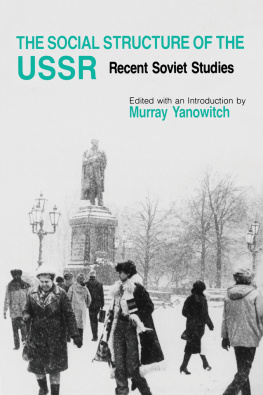SOVIET WORK ATTITUDES
Soviet Work Attitudes
The Issue of Participation in Management
Edited with an introduction by Murray Yanowitch
Martin Robertson
Oxford
First published 1979 by M.E. Sharpe and published in the United Kingdom by Martin Robertson & Co. Ltd.
Reissued 2018 by Routledge
2 Park Square, Milton Park, Abingdon, Oxon OX14 4RN
711 Third Avenue, New York, NY 10017, USA
Routledge is an imprint of the Taylor & Francis Group, an informa business
Copyright 1979 by Taylor & Francis
Articles 3, 5, and 6 in this volume are translated by agreement with VAAP, the Soviet Copyright Agency.
Translated by Michel Vale.
Published simultaneously as Vol. VIII, no. 4 of International Journal of Sociology
No part of this book may be reprinted or reproduced or utilised in any form or by any electronic, mechanical, or other means, now known or hereafter invented, including photocopying and recording, or in any information storage or retrieval system, without permission in writing from the publishers.
Notices
No responsibility is assumed by the publisher for any injury and/or damage to persons or property as a matter of products liability, negligence or otherwise, or from any use of operation of any methods, products, instructions or ideas contained in the material herein.
Practitioners and researchers must always rely on their own experience and knowledge in evaluating and using any information, methods, compounds, or experiments described herein. In using such information or methods they should be mindful of their own safety and the safety of others, including parties for whom they have a professional responsibility.
Product or corporate names may be trademarks or registered trademarks, and are used only for identification and explanation without intent to infringe.
Publisher's Note
The publisher has gone to great lengths to ensure the quality of this reprint but points out that some imperfections in the original copies may be apparent.
Disclaimer
The publisher has made every effort to trace copyright holders and welcomes correspondence from those they have been unable to contact.
A Library of Congress record exists under LC control number: 79004871
ISBN 13: 978-0-873-32147-1 (hbk)
ISBN 13: 978-1-315-17920-9 (ebk)
Murray Yanowitch
When a distinct sociological literature began to emerge in the Soviet Union in the early 1960s, there were good reasons for some of the Soviet scholars in this area to turn their attention to the study of work attitudes. What could be more appropriate in a society that proclaimed as one of its goals the transformation of labor into "a prime living need" rather than merely "a means to subsistence"? And it seemed natural to ask: How much progress had been made toward developing a distinctive "communist attitude toward work"? What were the behavioral correlates of such an attitude.
Quite apart from the Marxian ideological heritage and its expectation of changed work attitudes, however, there were more immediate and "practical" justifications for the serious study of attitudes toward work. Even a cursory acquaintance with the Soviet literature on labor problems provides abundant evidence of chronic difficulties with excessive labor turnover, poor work discipline, faulty work organization, and disappointing productivity performance. While some of these problems could be initially regarded as the normal accompaniment of the rapid and disruptive transformation of a predominantly peasant population into an industrial work force, they did not disappear when this work force began to be recruited largely from nonpeasant sources in the 1960s and 1970s. Indeed, in some respects the problem of mobilizing disciplined and sustained work effort became more serious as educational levels and along with them, job expectations increased and success in meeting production goals became increasingly dependent on advances in productivity rather than on large annual increments in the size of the work force. These were the circumstances in which pragmatic concerns with the sources of work discontent began to replace or, at the very least, to supplement the traditional rhetoric of "glory to communist labor."
The selections on work attitudes that appear in this volume are a small sample of the considerable Soviet literature from recent years that is directed to studying the experience of work. The first article, by V. A. Iadov, draws on a pioneering study of young Leningrad workers' job attitudes in the mid-1960s which has served as a model for later Soviet efforts in this area. Perhaps the principal finding of this study, reproduced in Iadov's article, was that the "richness of content of work," the "creative opportunities" offered by the job, was the single most important factor determining the attitude of the worker toward his position in the labor process. Without negating the importance of "material incentives," i.e., wage differentials, Iadov stresses that if the issue is the relative importance of money wages versus job content, the answer is unambiguous. Differences in the degree of work satisfaction experienced by workers in low-skilled manual jobs and in skilled, "high-content" jobs are substantially greater than differences in the average wage levels of these groups.
But the importance of work content as a determinant of work satisfaction was precisely the problem. Even in the early 1960s, Iadov claims, the proportion of workers with relatively high educational and cultural levels exceeded the proportion of "high content," creative jobs. Moreover, the "disproportion" between the relatively small number of satisfying jobs and the work aspirations created by rising educational levels could be expected to increase. In short, the problem of work discontent would become even more serious unless measures were taken to "compensate" workers for the gap between limited work content and the job aspirations fostered by extended schooling. Iadov's proposals for meeting this problem include job rotation, the provision of opportunities for "meaningful leisure" (presumably to offset limited opportunities for "meaningful work"), and the "development of various forms of participation of workers in the management of production." Although stated in rather general terms, these proposals illustrate the "practical" orientation of Soviet studies of work attitudes and an explicit recognition that solutions to the problems of poor work morale require more than properly designed systems of material incentives.
Like most American studies of work attitudes, Soviet examinations of this area have found that only a minority of workers voice explicit dissatisfaction with their job situation. But it is also clear that the frequency of job discontent varies markedly with workers' age, sex, and education. The evidence offered in the selection by N. A. Aitov suggests that work dissatisfaction reaches significant proportions among the young, the better educated, and women. For Aitov the measures required to reduce work dissatisfaction lie in the area of technology design. Unless technological policy is explicitly adapted to the task of eliminating the "contradiction" between job content and the educational level of workers, he suggests, a further deterioration in work attitudes will ensue.
A new direction in Soviet studies of work attitudes emerges in the last of the three articles on this theme (by V. A. Iadov and A. A. Kissel'). Contrary to the implicit assumption of most of these studies, Iadov and Kissel' argue that the level of job satisfaction is not systematically related to the actual performance of workers in production (their "productivity, conscientiousness, responsibility on the job"). High (or low) levels of work satisfaction are compatible with both poor and satisfactory work performance. The reason is that "the degree of work satisfaction provides merely an indication of the degree of a worker's adaptability to a particular organization and nothing more," where adaptability signifies the worker's assimilation of the demands made on him in the work process. Thus the measurement of work satisfaction as such is less important than study of the kinds of demands that the economic organization makes on workers and how these demands interact with the workers' own "dispositional structures" (their orientation toward "creativity and initiative," on the one hand, or toward the simple "execution of orders," on the other). This approach rejects the simplistic identification of work satisfaction as an invariably desirable state of affairs so characteristic of earlier Soviet literature on work attitudes. It implies that the more interesting question is: If workers exhibit a high degree of work satisfaction, what is it about their jobs that satisfies them the opportunity the jobs provide for "creativity and initiative" or for the routine "execution of orders"? Hence the relative insignificance of the level of job satisfaction viewed in isolation from the whole work environment.











